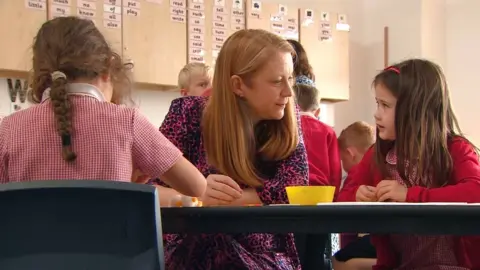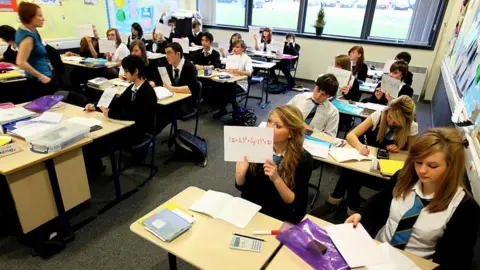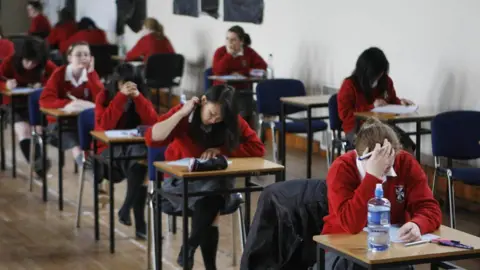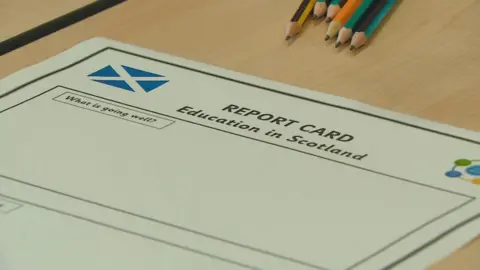What does the future hold for Scottish education?
 BBC
BBCThe Scottish government is seeking the views of children aged three to 18 to help draw up school reforms.
Sweeping changes are planned from primary schools right through to the final qualifications system, and ministers say they want young people to play a central role in this.
Why are these reforms happening, how long is it going to take, and what might education look like at the end of the process?
What's happening?
Education Secretary Shirley-Anne Somerville has started a "national discussion" with young people about the future of schooling, noting that it has been 20 years since the last big revolution in education.
It feels like change has been in the winds for some time, though. There has been a dizzying series of independent reviews, reports, advisory panels and inquiries over recent years.
Just for qualifications, there has already been the Stobart review, the Muir report and the Hayward review, which have culminated in plans to replace the exams body (the Scottish Qualifications Authority) and schools agency (Education Scotland).
A range of initiatives have also been targeted at closing the persistent "attainment gap" between schools in better-off and more deprived areas.
We may have built up to it somewhat gradually, but the intention is to draw up changes now which will stand though the next 20 years.
How radical will the changes be?
 Getty Images
Getty ImagesSeveral new agencies are going to be set up, including bodies focused on qualifications, the curriculum and inspections.
This is not going to be a total reset though, as ministers insist there is much to celebrate about the current set-up.
The Curriculum for Excellence will continue to form the base of the system, with Ms Somerville saying it is "tried and tested" as "the right foundation" for teaching.
There are open questions, however, from the start of schooling right to the end.
Several parties have voiced support for raising the age at which children start school, and the next SNP conference is to debate the idea of a "kindergarten" stage for children aged three to six.
The future of formal exams is up in the air too, after a major report from the OECD suggested that there was too much focus on them in the final years of schooling.
The pandemic era provided a snapshot of what the world might look like without exams, although teachers have expressed concerns about the workload that involved.
There may ultimately be compromises on both fronts, but Ms Somerville insists she is prepared to be "bold" in pursuit of change.
Who's in charge?
 PA Media
PA MediaThe government wants to consult as many "stakeholders" as possible - as well as young people, they are talking to parents, carers, teachers and their unions as well as officials.
But concerns have been raised in some quarters that depending on who is tasked with actually delivering them, the big changes promised could ultimately be a rebranding exercise.
The Times has reported that the current heads of the SQA and Education Scotland are both part of the "reform programme board". How different will things be if the same officials simply shift across from the old agencies to the new ones?
However, Ms Somerville insists that there are "critical friends" involved too, and that unions, academics and others will be involved to provide "challenge".
She said: "There is one person in charge of education reform in Scotland and that's me - and I'm absolutely determined to drive real change and real reform through."
How long is this going to take?

Years.
The SQA is already gearing up to deliver qualifications next year, given courses have started already.
The latest round of consultations will report back in spring 2023, with detailed plans to be drawn up after that.
Legislation will need to be tabled in parliament to set up the agencies, so that won't be tabled until towards the end of next year - meaning it likely won't be passed or implemented until at least 2024.
Ms Somerville says that "this is a process of reform - it will take a couple of years for us to see some of that happening, it may take longer for others".
But she stressed that "we are determined to start that right now, and there is real change that can happen in our system over the coming years".
Can we afford it?

This is a difficult moment to be running a government, with Scottish ministers warning that inflation has already eaten away £1.7bn of the current year's budget.
Cuts are on the agenda, and the education department was already looking at a flat cash settlement for the next three years.
One pupil in Dunfermline suggested to the minister that schools could have more teachers and newer materials; both things that cost money, particularly in light of the escalating pay rows with teaching unions.
Ms Somerville accepted that it was important to look at "value for money" while setting up the new education agencies. But she stressed that "getting it right for every child and young person" was integral to this, and that education was still a core department for the government.
She pointed to the first minister's comments in 2016 about education being her "number one priority", and the one she wanted to be judged on.
That is a line which has been thrown back at Nicola Sturgeon ever since - so there is no little pressure on the education secretary to deliver.
